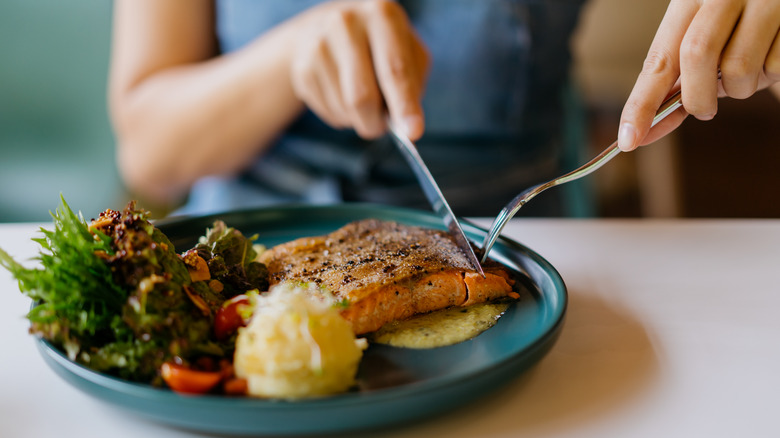The Nutritious Protein That Has More Potassium Than A Banana
Experts advise getting approximately 4,700 milligrams of potassium daily, reports Harvard Health Publishing. Yet the majority of people in the U.S. are falling short by more than half of this amount. Potassium intake should not be ignored. This essential mineral is paramount to the health of our cells, nerves, and muscles. It also helps the body maintain a normal heartbeat, metabolize carbohydrates, and much more. Eating foods loaded with potassium may also help prevent muscle spasming and thereby spare us the pain of a dreaded charley horse foot cramp, says Healthy Solutions Medical Weight Loss and Spa.
Potassium can be found in a variety of food items. This includes leafy greens, potatoes, lentils, tilapia, yogurt, raisins — the list goes on and on. Most of us associate potassium with bananas, and rightfully so. In a 100-gram serving of raw banana, you'll find 358 milligrams of potassium (via U.S. Department of Agriculture). If you're not a huge fruit fan, however, we have good news for you. There's one nutritious protein that offers us even more potassium in the same-size serving.
The potassium content of wild-caught salmon
Behold the mighty salmon. In a 100-gram serving of cooked wild Atlantic salmon, you'll get an impressive 628 milligrams of potassium (via USDA). Remember, in the same 100-gram serving of raw banana, you'll find only 358 milligrams of potassium. However, a similar 101-gram serving of raw banana is only the equivalent of a small-sized banana measuring around 6 inches to just under 7 inches long. Most of us aren't eating a banana that small. Therefore, does salmon still trump a larger-sized banana in terms of potassium content?
Indeed, it does. One medium-sized raw banana measuring between 7 inches and just under 8 inches long contains 422 milligrams of potassium. As you can see, salmon still comes out on top. The same is true even for a large banana measuring between 8 inches and just under 9 inches in length, which contains 487 milligrams of potassium. Even if you ate a banana that is or exceeds 9 inches in length, the fruit would still come up short. The USDA states that this 152-gram extra-large serving of raw banana contains 544 milligrams of potassium. While bananas are undeniably a great source of potassium, we now know that wild salmon definitely is, too.
Farmed salmon has lesser amounts of potassium
The amount of potassium drops, however, when we look at cooked farmed Atlantic salmon as opposed to wild-caught salmon. In a 100-gram serving of cooked farmed salmon, you'll find 384 milligrams of potassium (via USDA). That's a substantial decrease from the 628 milligrams packed into the same-size serving of wild-caught salmon. In comparison to that 101-gram small-sized banana we talked about, which contains 362 milligrams of potassium, farmed salmon just barely squeaks by as the winner. Once we get into medium-sized and larger-sized bananas, though, the fruit takes first place.
Whether farmed or wild-caught, salmon is still rich in health benefits. For example, all that potassium may reduce one's risk of cardiovascular disease, reports Healthline. In a 2017 rodent study published in JCI Insight, the researchers examined the relationship between a lack of potassium and heart disease. They found that mice who consumed less potassium showed greater amounts of calcium buildup in their arteries and increased aortic stiffness than mice who ate normal amounts of potassium. Oppositely, consumption of higher-than-average amounts of potassium was linked with reduced vascular calcification and aortic stiffness, both of which are risk factors for cardiovascular diseases.



